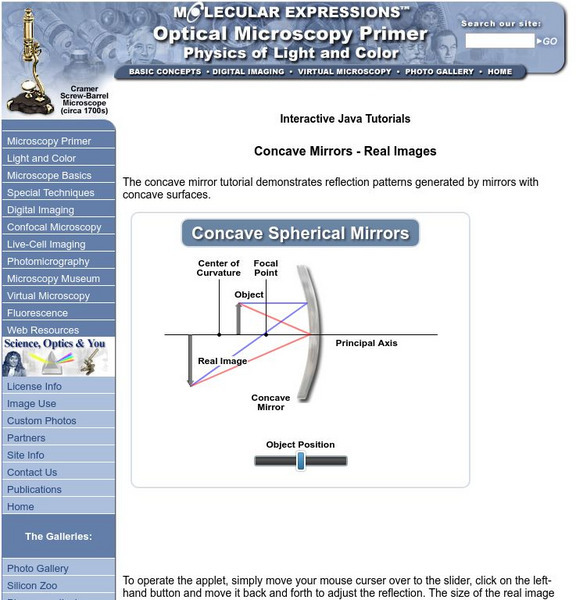Curated OER
Physical Difference and Classification
Students use a microscope and observation skills to compare and contrast several physical properties and develop a classification system.
Curated OER
Math is Beautiful: Tessellation
Learners examine patterning in Chinese and Japanese artwork prior to creating their
own tessellations using styrofoam plates in this creative cross-curricular instructional activity for upper-elementary/middle level classrooms.
Curated OER
Logo Licenses
Third graders find all the lines of reflection symmetry in a given shape, identify the order of rotational symmetry of a given shape. They create designs which have reflection symmetry, rotational symmetry (orders 2, 3, 4, 6) and...
Curated OER
Self Portrait Ideas
Students review multiple ideas for creating a self portrait including abstract versions, PowerPoint presentations, sculptures, ceramic plates, photography and shadow boxes. They create self portraits.
Curated OER
Street People
Learners research homelessness including how people end up living on the streets and other related issues such as government response and charity. Using their research, students engage in improvisation, role-plays and monologues on the...
Curated OER
Japanese Peasants
Students examine how the Japanese peasant was depicted in art in this high school lesson plan about Asian cultures. Emphasis is placed on individual observations and written reflections.
Curated OER
Japanese Tanka Poetry
Students discover the techniques of creating Japanese Tanka poetry through in-class discussions and a fun group competition. This lesson is an excellent introduction to Japanese literature and/or poetry.
Physics Classroom
The Physics Classroom: Reflection/ray Model of Light: Convex Mirror Images
Students explore three different ray diagrams for objects positioned at different locations along the principal axis in a convex mirror.
Smithsonian Institution
Smithsonian Learning Lab: Turn About's Fair Play! Mirrors and How They Reflect
Teachers can download this teaching package that looks at light and symmetry through the use of mirrors. Students will enjoy the nine mirror challenges, along with the hands-on activities described in the lessons. Teachers will...
Florida State University
Florida State University: Microscopy Primer: Concave Mirrors: Real Images
Florida State University offers an interactive Java applet demonstrating the object-image relationships for a concave mirror. The position of the object can be dragged along the principal axis and the location, orientation, and size of...
Other
University of Montana: Curved Mirrors
This calculus tutorial with curved mirrors includes narrative and video presentations as well as other interactive tools.
Physics Classroom
The Physics Classroom: Lesson 3: Concave Mirrors
Lesson 3 of this tutorial on refraction is on concave mirrors. Content that is covered includes the anatomy of curved mirrors, reflection of light and image formation, ray diagrams, image characteristics for concave mirrors, plus more.
Georgia State University
Georgia State University: Hyper Physics: Mirrors in Imaging
A discussion from Georgia State University of different types of mirrors and the images which they create. Discusses different instruments which use mirrors to produce images.
Khan Academy
Khan Academy: Objects in the Mirror Are...' Actually Images in the Mirror
This article from Khan Academy provides information about mirrors. This information is intended for the Class 12 Physics Course (India).
CK-12 Foundation
Ck 12: Physical Science: Mirrors
[Free Registration/Login may be required to access all resource tools.] How a mirror forms images and how to distinguish between real and virtual images, and the different types of mirrors and the images they produce.
Georgia State University
Georgia State University: Hyper Physics: Mirror Instruments
This site from Georgia State University discusses the means by which mirrors and lenses are combined to produce an optical instrument which accomplishes a specific purpose. Good illustrations.
Open Curriculum
Open Curriculum: Images, Quantitatively
This article helps students quantitatively describe the changes in images on mirrors or other surfaces.
Physics Classroom
The Physics Classroom: Image Formation for Plane Mirrors
Scroll down to Lesson 2 for a tutorial on image formation in plane mirrors. The tutorial from Glenbrook South High School provides lessons on why and how an image is formed, image characteristics for plane mirrors, ray diagrams, plus more.
Physics Classroom
The Physics Classroom: Image Formation for Concave Mirrors Case A
This animation depicts the path of light to each person's eye. Different people are sighting in different directions; yet each person is sighting at the same image location. In this animation the image location is the intersection point...
Physics Classroom
The Physics Classroom: Ray Diagrams for Concave Mirrors Case B
Ray diagrams are useful tools for determining the location of an image as produced by a concave mirror. Of all the rays which emanate from the top of the object arrow and are incident to the mirror, there are two rays whose behavior at...
Physics Classroom
The Physics Classroom: Ray Diagrams for Concave Mirrors Case D
Ray diagrams are useful tools for determining the location of an image as produced by a concave mirror. Of all the rays which emanate from the top of the object arrow and are incident to the mirror, there are two rays whose behavior at...
Physics Classroom
The Physics Classroom: Ray Diagrams for Concave Mirrors Case A
Ray diagrams are useful tools for determining the location of an image as produced by a concave mirror. All concave and convex mirror ray diagrams can be constructed from knowledge of the behavior of two rays. Learn here about ray diagrams.
Georgia State University
Georgia State University: Hyper Physics: Ray Diagrams for Mirrors
Provides a discussion of curved mirrors and ray diagrams. Shows and explains the process of drawing a ray diagram to determine the image location, size, and orientation.
Physics Classroom
The Physics Classroom: Reflection and Mirrors: Name That Image Interactive
Students participate in this skill-building activity where they explore how the location of an object in front of a curved mirror affects the characteristics of the projected image.
Other popular searches
- Drawing Mirror Images
- Book With Mirror Images
- Mirror Images in Geometry
- Book Cwith Mirror Images
- Science Mirror Images
- Images in Concave Mirror
- Painting Mirror Images
- Mirror Images of Letter
- Images in Curved Mirror
















